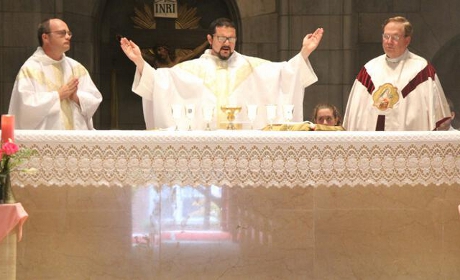- Home
-
About
 Fidelity & Excellence
Fidelity & ExcellenceThomas Aquinas College is unique among American colleges and universities, offering a faithfully Catholic education comprised entirely of the Great Books and classroom discussions.
-
A Liberating Education
 Truth Matters
Truth MattersTruth, and nothing less, sets men free; and because truth is both natural and supernatural, the College’s curriculum aims at both natural and divine wisdom.
-
A Catholic Life
 Under the Light of Faith
Under the Light of FaithThe intellectual tradition and moral teachings of the Catholic Church infuse the whole life of Thomas Aquinas College, illuminating the curriculum and the community alike.
-
Admission & Aid
 Is TAC Right for You?
Is TAC Right for You?Do you enjoy grappling with complex questions? Are you willing to engage in discussions about difficult concepts, with the truth as your ultimate goal?
-
Students & Parents
 Mind, Body & Spirit
Mind, Body & SpiritThere is always something to do at TAC — something worthwhile, something fulfilling, and something geared toward ever-greater spiritual and intellectual growth.
-
Alumni & Careers
 What Can You Do with a Liberal Education?
What Can You Do with a Liberal Education?Nothing speaks more to the versatility of the College’s academic program than the good that our alumni are doing throughout the Church and the world.
- Search
- Giving
Itinerant Preacher: Rev. Reginald (Ryan ’97) Wolford, O.P.

On Saturday, October 1, the Most Rev. Robert J. Hermann, Auxiliary Bishop Emeritus of St. Louis, Missouri, laid hands on Rev. Reginald (Ryan ’97) Wolford, O.P., conferring upon him the Sacrament of Holy Orders. For Fr. Reginald, the timing of his ordination could not have been better. “I love St. Thérèse, and I have read her autobiography many times, including on my pre-ordination retreat. So I was honored to be ordained on her feast day.”
He did, however, have one “small regret.” Because he and his fellow Dominican Friars of the Province of St. Albert the Great would be celebrating his ordination, they would be unable to celebrate St. Thérèse’s feast day. Fortunately, providence intervened. “I offered my first Mass the next day at Little Flower Church in St. Louis, which was granted the privilege of celebrating its patroness’ feast on Sunday,” Fr. Reginald explains. “So when I arrived that morning, I learned that my first Mass would be for St. Thérèse. I think she might have worked it out that way.”
Providence has “worked out” much in the life of Fr. Reginald, who arrived at Thomas Aquinas College in 1993 as a teenager whose religious convictions fell somewhere between indifference and agnosticism. “My family was not Catholic,” he says. “I was baptized at the age of 10 in a Disciples of Christ church, but by the time I came to the College, we didn’t really go to church at all, and I didn’t know if I believed in anything.”
When Fr. Reginald was in high school, an ad for the College had caught his eye. “I was very interested in studying the great books via the Discussion Method,” he recalls, so he drove the 100 miles from his family home in Rancho Cucamonga, California, to visit. “I felt so at home there,” he says, “that I didn’t apply anywhere else.”
He did not remain spiritually indifferent for long. “I had been thinking about the Faith and had a few conversations around the dorm, and then someone invited me to Mass, so I showed up,” he says. The experience was transformative. “I was just fascinated by it all — the Latin, the Gregorian chant, the incense, the silence. I was hooked from that moment.” He soon began receiving religious instruction from one of the College’s chaplains, the late Rev. Wilfred Borden, O.M.I., and at that year’s Easter Vigil received a conditional baptism, his confirmation, and his first Holy Communion.
“From the time of my conversion I suspected I had a priestly vocation,” he notes, but careful to temper his convert’s zeal, he proceeded cautiously. After graduating from the College in 1997, he looked into a few religious communities but was “not ready to take the step yet.” So he spent some time testing various careers and interests — working in the arts in North Carolina, teaching at a boys’ middle school in Harlem, and earning a master’s degree at Austria’s International Theological Institute.
Finally, in 2006, he entered the Canons Regular of the Immaculate Conception, a small religious community based near the College’s campus in Santa Paula, California. While with the Canons he earned an STB at the Angelicum in Rome, was ordained to the transitional diaconate, and pursued a doctorate at Mundelein Seminary in Chicago.
During his time in Chicago, however, he began to question his vocation — not to the priesthood and the religious life, but to his particular community. “I met a Dominican friar and, in talking to him, began to discern a desire for the Dominican Order,” he says. “I think it’s kind of a natural fit for me, having been educated in the Dominican tradition at the College. The academic apostolate, the study of St. Thomas, the Dominican tradition — I find it all very fascinating. The Dominicans are the itinerant preachers who are trying to reconcile people to the Church through their preaching. That is a role I hope to embrace.”
With the permission of both orders, Fr. Reginald thus began a three-year transitional period, which concluded in August, thus paving the way for his ordination. “All I can say is that it has all been the blessings of Providence,” he says. “I may have dragged my feet here and there, but I have tried ever to follow the Lord’s plan for me, and I am attempting to give myself to it fully.”

